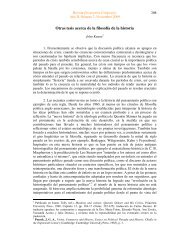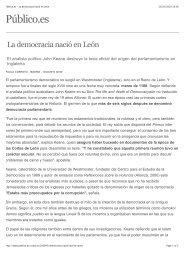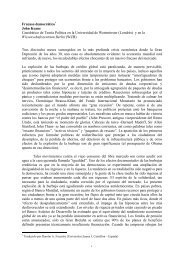Alexandre Koyré, 'The Political Function of the Modern Lie ...
Alexandre Koyré, 'The Political Function of the Modern Lie ...
Alexandre Koyré, 'The Political Function of the Modern Lie ...
Create successful ePaper yourself
Turn your PDF publications into a flip-book with our unique Google optimized e-Paper software.
Illustrata (Politics Methodically Digested, Illustrated with Sacred and Pr<strong>of</strong>ane<br />
Examples [1603]), organised lying was restricted in geographic scope and social<br />
depth. <strong>Lie</strong>s have short legs, ran a sixteenth-century English proverb. When spun by<br />
<strong>the</strong> powerful <strong>the</strong>ir webs did not penetrate easily into a political landscape comprising<br />
a mosaic <strong>of</strong> emerging territorial state monarchies co-existing with many differently<br />
sized consociations intersecting from a distance, a world <strong>of</strong> royal courts, free cities,<br />
religious emperors, provincial lords and <strong>the</strong> Holy Roman Empire, a kaleidoscope <strong>of</strong><br />
different, sometimes overlapping jurisdictions whose inhabitants were mainly<br />
illiterate and normally had little or no contact, except for messages conveyed by<br />
means <strong>of</strong> rumour, or by foot, horse and donkey. Our times are different. <strong>Political</strong> lying<br />
can easily flourish in <strong>the</strong> age <strong>of</strong> media saturation, especially under conditions <strong>of</strong> fear<br />
and war, when rising or ascendant groups can satisfy <strong>the</strong>ir hunger for power over<br />
o<strong>the</strong>rs by persuading <strong>the</strong>m to feed on vast untruths peddled through communication<br />
media that penetrate deeply into people‟s everyday lives. Mobile telephones, radio,<br />
film and television and <strong>the</strong> Internet leng<strong>the</strong>n lies‟ legs, <strong>the</strong>ir ability to spread rapidly<br />
through vast populations, persuading fearful or confused people that <strong>the</strong> powerful are<br />
correct in <strong>the</strong>ir descriptions <strong>of</strong> reality, even though <strong>the</strong>y deliberately say things that<br />
<strong>the</strong>y <strong>the</strong>mselves know are not so. Think <strong>of</strong> just two epochal moments in our lifetime:<br />
<strong>the</strong> 1964 Gulf <strong>of</strong> Tonkin incidents during <strong>the</strong> Vietnam War, <strong>the</strong> first televised war; or<br />
<strong>the</strong> Weapons <strong>of</strong> Mass Destruction saga in <strong>the</strong> so-called war against terrorism <strong>of</strong> our<br />
times. War does indeed nurture <strong>the</strong> doctrine that <strong>the</strong> powerful must be allowed to<br />
operate in secrecy, according to reasons <strong>of</strong> state, using hidden counsels wrapped in<br />
cultic mystery (arcana imperii); which is why, in an era <strong>of</strong> mass communications, war<br />
is not just destructive <strong>of</strong> human life but also poses grave dangers for democratic<br />
institutions and <strong>the</strong>ir spirit <strong>of</strong> openness and plurality.<br />
But how does it happen that mass media-saturated societies are unusually prone to <strong>the</strong><br />
production, reproduction and public circulation <strong>of</strong> lies?<br />
It has been said by Martin Jay, drawing on <strong>the</strong> work <strong>of</strong> Hannah Arendt, that since<br />
politics is <strong>the</strong> realm <strong>of</strong> action, and since by definition it always involves <strong>the</strong> capacity<br />
to be inventive and to bring novelty into <strong>the</strong> world, it typically draws on our capacity<br />
for imagination, which is a mark <strong>of</strong> our capacity for freedom. On this view, lying,<br />
6





